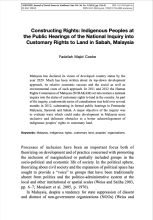/ library resources
Showing items 28 through 36 of 383.For a long time the issue of land and related problems has been debated mostly by academicians, politicians and professionals. Although the problem has remained more or less one of the most talked of in Kenya, the public has very often been left out of the debate.
The International Land Coalition (ILC) has commissioned this present report to analyze the illegal/irregular acquisition of land by Kenya’s elites to ascertain the types of land affected, the processes used to acquire land, and the profiles of the perpetrators, as wel
A majority of the Kenyan population live in rural areas accessing land and natural resources through customary systems and institutions that operate largely outside the mainstream legal framework of land administration.
This analysis and recommendations stem from USAID/Kenya’s request for an assessment of Kenya’s draft National Land Policy (dNLP).4 It was conducted under the global task order: Property Rights and Resource Governance Program, a mechanism designed and supervised by USAID-EGAT’s Land Resources Mana
Malaysia has declared its vision of developed country status by the year 2020. Much has been written about its top-down development approach, its relative economic success and the social as well as environmental costs of such approach.
In Afghanistan, insecurity over land and water rights hampers investments in food production and irrigation. In rural areas, customary tenure systems, partly based on religious law, are the most relevant but suffer from weak recognition and offer little protection to rights holders.
According to a 2008 World Bank Report, Uganda is among the countries with the youngest population and the highest youth unemployment rate of 83%.
Issues surrounding customary land governance reforms remain at the forefront of policy reforms in many African countries because of concern over discriminatory rules of access, exchange, and inheritance, corruption, elite capture, and illegal land occupations, (Arko Adjei, 2009).
There is a gap between land tenure and the physical land giving room for impersonation, multiple allocation and sale of plots, loss of possession, land racketeering and fraud through forgery.
Нумерация страниц
Land Library Search
Through our robust search engine, you can search for any item of the over 73,000 highly curated resources in the Land Library.
If you would like to find an overview of what is possible, feel free to peruse the Search Guide.







